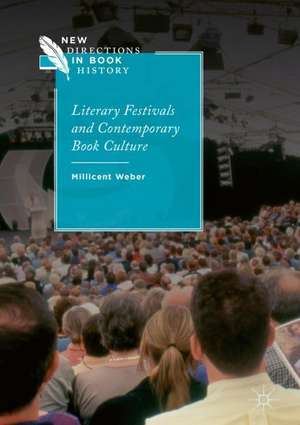Literary Festivals and Contemporary Book Culture: New Directions in Book History
Autor Millicent Weberen Limba Engleză Hardback – 18 apr 2018
There has been a proliferation of literary festivals in recent decades, with more than 450 held annually in the UK and Australia alone. These festivals operate as tastemakers shaping cultural consumption; as educational and policy projects; as instantiations, representations, and celebrations of literary communities; and as cultural products in their own right. As such they strongly influence how literary culture is produced, circulates and is experienced by readers in the twenty-first century. This book explores how audiences engage with literary festivals, and analyses these festivals’ relationship to local and digital literary communities, to the creative industries focus of contemporary cultural policy, and to the broader literary field. The relationship between literary festivals and these configuring forces is illustrated with in-depth case studies of the Edinburgh International Book Festival, the Port Eliot Festival, the Melbourne Writers Festival, the Emerging Writers’Festival, and the Clunes Booktown Festival. Building on interviews with audiences and staff, contextualised by a large-scale online survey of literary festival audiences from around the world, this book investigates these festivals’ social, cultural, commercial, and political operation. In doing so, this book critically orients scholarly investigation of literary festivals with respect to the complex and contested terrain of contemporary book culture.
| Toate formatele și edițiile | Preț | Express |
|---|---|---|
| Paperback (1) | 637.78 lei 6-8 săpt. | |
| Springer International Publishing – 26 ian 2019 | 637.78 lei 6-8 săpt. | |
| Hardback (1) | 643.16 lei 6-8 săpt. | |
| Springer International Publishing – 18 apr 2018 | 643.16 lei 6-8 săpt. |
Din seria New Directions in Book History
- 17%
 Preț: 393.55 lei
Preț: 393.55 lei - 20%
 Preț: 689.08 lei
Preț: 689.08 lei - 18%
 Preț: 950.21 lei
Preț: 950.21 lei - 20%
 Preț: 691.41 lei
Preț: 691.41 lei - 15%
 Preț: 697.47 lei
Preț: 697.47 lei - 15%
 Preț: 525.35 lei
Preț: 525.35 lei - 15%
 Preț: 525.54 lei
Preț: 525.54 lei -
 Preț: 384.86 lei
Preț: 384.86 lei - 18%
 Preț: 786.18 lei
Preț: 786.18 lei - 15%
 Preț: 581.79 lei
Preț: 581.79 lei - 18%
 Preț: 891.17 lei
Preț: 891.17 lei -
 Preț: 431.94 lei
Preț: 431.94 lei - 15%
 Preț: 587.53 lei
Preț: 587.53 lei - 18%
 Preț: 729.23 lei
Preț: 729.23 lei - 15%
 Preț: 524.22 lei
Preț: 524.22 lei - 18%
 Preț: 737.89 lei
Preț: 737.89 lei -
 Preț: 381.98 lei
Preț: 381.98 lei - 18%
 Preț: 724.50 lei
Preț: 724.50 lei - 15%
 Preț: 640.55 lei
Preț: 640.55 lei - 18%
 Preț: 779.57 lei
Preț: 779.57 lei - 15%
 Preț: 582.30 lei
Preț: 582.30 lei -
 Preț: 452.25 lei
Preț: 452.25 lei - 15%
 Preț: 587.20 lei
Preț: 587.20 lei - 18%
 Preț: 785.11 lei
Preț: 785.11 lei - 20%
 Preț: 525.35 lei
Preț: 525.35 lei - 15%
 Preț: 637.78 lei
Preț: 637.78 lei - 18%
 Preț: 785.55 lei
Preț: 785.55 lei - 18%
 Preț: 789.52 lei
Preț: 789.52 lei - 18%
 Preț: 947.50 lei
Preț: 947.50 lei - 18%
 Preț: 779.08 lei
Preț: 779.08 lei -
 Preț: 221.43 lei
Preț: 221.43 lei -
 Preț: 419.81 lei
Preț: 419.81 lei - 15%
 Preț: 697.32 lei
Preț: 697.32 lei -
 Preț: 384.86 lei
Preț: 384.86 lei
Preț: 643.16 lei
Preț vechi: 756.65 lei
-15% Nou
Puncte Express: 965
Preț estimativ în valută:
123.06€ • 128.50$ • 101.62£
123.06€ • 128.50$ • 101.62£
Carte tipărită la comandă
Livrare economică 15-29 aprilie
Preluare comenzi: 021 569.72.76
Specificații
ISBN-13: 9783319715094
ISBN-10: 3319715097
Pagini: 255
Ilustrații: XIII, 272 p. 11 illus.
Dimensiuni: 148 x 210 mm
Greutate: 0.49 kg
Ediția:1st ed. 2018
Editura: Springer International Publishing
Colecția Palgrave Macmillan
Seria New Directions in Book History
Locul publicării:Cham, Switzerland
ISBN-10: 3319715097
Pagini: 255
Ilustrații: XIII, 272 p. 11 illus.
Dimensiuni: 148 x 210 mm
Greutate: 0.49 kg
Ediția:1st ed. 2018
Editura: Springer International Publishing
Colecția Palgrave Macmillan
Seria New Directions in Book History
Locul publicării:Cham, Switzerland
Cuprins
1. Introduction.- 2. Recognising Literary Festivals.- 3. Patterns of Attendance and Experience.- 4. Online and Onsite: Intersections in Embodied and Digital Engagement.- 5. Festival as Policy Vehicle: Creative Industries, Creative Cities and the Creative Class.- 6. Festival as Field: Literary Festivals as Instantiations of Larger Cultural Spaces.- 7. Conclusion: Rules of the Game.
Recenzii
“She proffers a back-to-basics understanding of literary festivals that reconnects the enduring love triangle of author, reader, and book while appealing to the likes of academics, policymakers, and festival organizers. … Literary Festivals and Contemporary Book Culture is a solid step in formulating a comprehensive approach to analyzing literary festivals and their appeal to book enthusiasts and literary critics alike.” (Gloria Mulvihill and Nicholas Shea, Publishing Research Quarterly, 2019)
Notă biografică
Millicent Weber is a Lecturer in English at the Australian National University, where she is part of the Reading at the Interface project team. Her work on literary festivals has been published by scholarly journals Continuum and Convergence and literary magazine Overland, and she co-edited the collection Publishing Means Business: Australian Perspectives (2017).
Caracteristici
Sociological approach fuses audience research with theoretical analysis of contemporary cultural policy initiatives Until now the behaviour and experiences of literary festival audiences have been a relatively under-researched aspect of these festivals’ constitution Demarcates the cultural and social potential of literary festivals, and the barriers to participation in these equitable spaces
